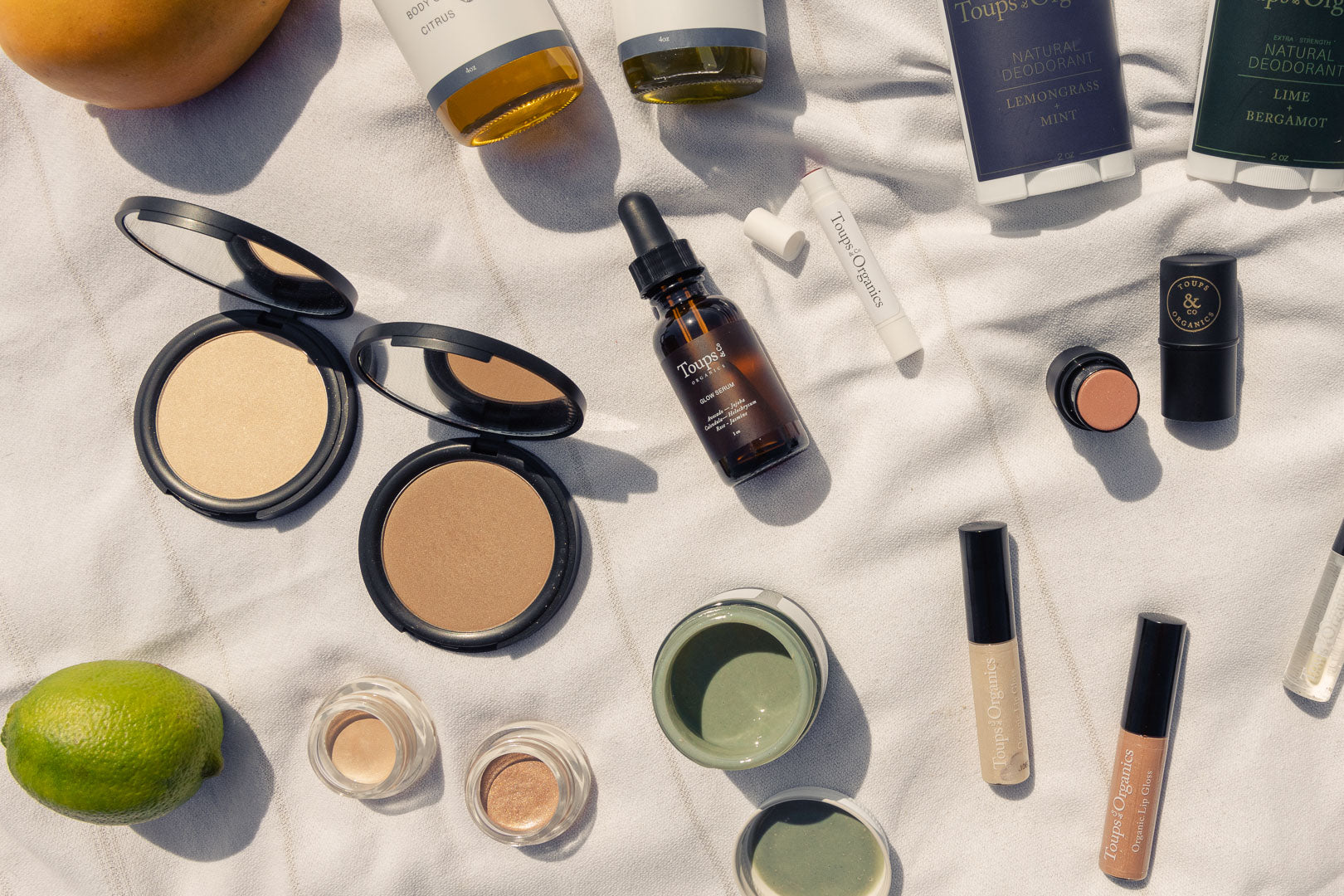Picking out your first ever makeup products was a pivotal moment in your life.
Maybe it was a lipstick from the local drugstore that gave you instant classic Hollywood vibes (Grace Kelly, is that you?). Or the perfect color-popping eye palette that finally boosted your confidence to wear glasses.
You have an emotional connection to makeup.
It helps you feel beautiful (even though you already are).
It unleashes creativity.
And it connects you to the past and the future.
But every good thing has its drawbacks. And conventional makeup brands are hiding dirty secrets (literally). They’re called forever chemicals.
Let us explain…
What Are Forever Chemicals (Aka, PFAS)?
Forever chemicals are appropriately named. It’s estimated that they take over 1,000 years to completely decompose. But since they’re microscopic, most of us don’t even realize they’re heavily polluting our environment and our bodies.
The technical name for forever chemicals is per- and polyfluoroalkyl substances (PFAS for short). PFAS were initially created to coat non-stick pots and pans. Today, they’re used to increase the lifespan of personal care products, clothing, furniture, and more. Since they (basically) never break down, they’re a prime group of chemicals to increase durability and slow down wear and tear. But at what cost?
It’s estimated that 98% of Americans have PFAS in their bloodstream (including newborn and preborn babies). This is particularly concerning since PFAS are connected to thyroid dysfunction, hormone disruption, and liver issues. Since toxins are stored in adipose tissue (fat), PFAS may contribute to weight gain.
PFAS in Makeup — Why Are They Used?
There is nothing like the relief of a clean face after a long day. But did you know washing your makeup down the drain may be contributing to an environmental crisis? Yep. PFAS have catastrophic health concerns—and since they don’t easily decompose, they remain in the environment (even after you wash your face).
Forever chemicals are used in makeup products to create a sheen or smooth finish. They also contribute to waterproof products and allow makeup to last longer before expiration.
Because PFAS (basically) never break down, they’re intentionally added to makeup products to increase the length of wear, durability, and the product’s lifetime.
As an organic makeup brand ourselves, we can confirm: it’s actually not that hard to create stunning makeup without PFAS—that still lasts all day. It just takes a little more intentionality, ancestral wisdom, and a commitment to better health.
PFAS Health Risks
How much impact exactly could a group of microscopic chemical compounds have on your health? The list of PFAS health risks just keeps growing…
- Liver Damage — Like any other environmental toxin, PFAS are hard on the liver and may cause damage.
- Birth Defects — The majority of people have PFAS in their blood, and heavy levels are known to impact infants, specifically their birth weight.
- Thyroid Health — Is something impacting your endocrine system? Forever chemicals have a lot of connections with serious thyroid disruption.
- Hormone Disruption — Forever chemicals are known to disrupt hormones. Their drastic increase in our environment may contribute to children reaching puberty earlier.
Forever chemicals are especially concerning because, as their name suggests, they’re made to last forever. This means they don’t break down when they get into our bodies. Instead, our immune system is forced to work overtime to eliminate PFAS. Avoidance is always the best way to keep forever chemicals from impacting your health.
Identifying Forever Chemicals in Your Home
Forever chemicals have made national news on more than one occasion. They continue to be the subject of medical studies, drawing serious health and environmental concerns. But stressing about them isn’t the answer (seriously, it’s not).
Instead, take control of your environment. Understand the products that are most likely to contain high levels of PFAS and make adjustments. Here are a few suggestions:
- Tap Water — Use reverse osmosis water filters to remove PFAS from your drinking water (one of the most common sources of forever chemical exposure).
- Makeup Products — It’s estimated that 90% of makeup products contain PFAS. One way to potentially lower your exposure to PFAS is to choose products that aren’t waterproof or long-lasting. But ultimately, we recommend finding an organic makeup brand you trust.
- Non-Stick Pans — Learn to cook the ancestral way, without non-stick pots and pans that typically contain heavy doses of PFAS. Cast iron and stainless steel are great alternatives.
- Food Packaging — Pre-packed food and especially fast foods are big contributors to PFAS in the environment. Try eating out less or only going places that use paper packaging.
- Clothing — 100% cotton or wool clothing is healthier for your body anyway. And when you prioritize those options over yoga pants and activewear, you’re more likely to avoid forever chemicals.
- Period Products — Seriously, PFAS are found in pads, tampons, and even reusable period underwear.
Identifying Forever Chemicals on Ingredient Labels
Reading ingredient labels at the grocery store either makes you feel like a health wizard or (if you’re like us) extremely confused. But forever chemicals can be easy to identify when you know what you’re looking for. Check your bottles for the word “fluoro.” Better yet, avoid waterproof and long-lasting makeup products altogether.
Help Eliminate Forever Chemicals from the Environment by Making Your Voice Heard
We get it. Taking on responsibility for the environmental pollution caused by multi-billion dollar corporations feels completely uncool. And, it is. Consumers didn’t create forever chemicals. In fact, we didn’t even know about them until recently.
When the manufacturing of PFAS began, we weren’t given a voice.
Now, data is rising. We have the information. We know what’s happening with PFAS and their impact on disease. For the first time, we have the power to change our environment now—and for our children and grandchildren.
By using healthy alternatives (for example: organic furniture, cotton clothing, homemade products, and organic makeup brands), we can support responsible consumption. And, we can advocate for the future by helping pass laws that ban PFAS. Let’s put in the work to spread awareness, fund medical studies, and watch our planet change for the better.

